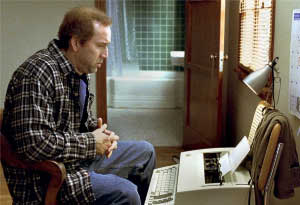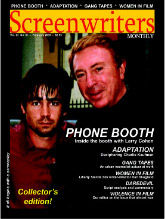
An Unorthodox ADAPTATION: Deciphering Charlie Kaufman
March 11th, 2004
 An Unorthodox ADAPTATION: Deciphering Charlie Kaufman
An Unorthodox ADAPTATION: Deciphering Charlie Kaufman
Interview by By Fred Topel
When Charlie Kaufman sat down to adapt The Orchid Thief into a screenplay, he was stumped. The book is largely a musing on flowers with hints of biography on John Laroche. After months of frustration, Kaufman decided instead to write the story of his attempts to adapt the book. The now acclaimed film features Nicolas Cage as both Kaufman and a more mainstream-minded twin brother, Donald, with parallel stories of Orchid Thief author Susan Orlean (Meryl Streep) and Laroche (Chris Cooper).
The real Kaufman is not exactly like Cage portrays him. He's not balding, but rather has a full bushy head of hair. He's not overweight. In fact, he's a tad waifish. He does sweat though. That part's true. As an interviewer, I found Kaufman to be cagey about his motivations. It's more like an expedition than an interview, but those gems you find buried within his ambiguity may provide inspiration for other writers in similar positions of writer's block.
What are the true events in the film? I'm of the mind that I would rather not go through a checklist of what's true and what's not true.
Just give us one thing. I wrote the screenplay and the way it plays out in terms of my decision to put myself in the screenplay is pretty close to the truth, and the reason I took this job. Charlie Kaufman's story of taking the job and becoming frustrated and deciding to put himself in the screenplay is true.
 Why do you visualize yourself fat and balding? Because I wanted to write a character who was insecure and who had specific insecurities but since no one knows who I am, I took the liberty of making them up and not having them be the specific ones that I suffer from because it gave me more freedom to do it.
Why do you visualize yourself fat and balding? Because I wanted to write a character who was insecure and who had specific insecurities but since no one knows who I am, I took the liberty of making them up and not having them be the specific ones that I suffer from because it gave me more freedom to do it.
What was it like having Nic imitate your mannerisms? I'm not sure that I see him doing me. I'm told there are moments in the movie where other people see him doing me, but I don't see myself so clearly. So, I don't have that experience.
How do you keep the multiple levels of reality straight? I get confused when I'm writing it and sometimes when we talk about it. In editing, every time we move a scene around, we have to sit down with the editor and look at this big board and say, "If we move this here, what would that mean?" Then we have to go through Orlean's story, and LaRoche's story and Charlie's story, and Donald's story. Another thing I found was, after I wrote it, while I was writing it I was immersed in it and it's easy for me to jump back and forth between the storylines, but a year later when I'm doing a rewrite I can't remember why I did certain things. I know there's a reason that these two scenes are married but I don't know why. It does get complicated when you're away from it.
You were more involved on the set than you're portrayed in the movie? I think actually my time on the set is the least of my involvement. I'm more involved in pre-production and post-production. On the set, I'm there occasionally if there's a scene that needs to be looked at or changed. But [Spike] is directing, they're acting and I'm just standing there. I have other things to do. I have writing to do, so I do it.
Talk about creating Donald? Well, this hearkens back to what I said earlier. Donald's existence or non-existence is something that we don't want to address because the movie is credited to Charlie and Donald. That is an important element in understanding the movie. What happens in the movie is tied to that fact. To say that Donald's a creation of mine is something I don't want to do. We're presenting this movie as written by Charlie and Donald.
Does the Writer's Guild have any issues with crediting this ambiguous Donald? Answering the question is something I don't want to do because then it becomes, "Oh, well, yeah." You know what I mean?
How do you really feel about Robert McKee and his Story lectures which you portray in this film? Robert McKee has been really nice to us and he's let us use his name and his words and we've met with him a few times. I don't have anything negative to say about McKee. I feel like it's not my background, it's not my way of working, but I don't want to dictate to anybody else how they should go about learning their craft. If people find it helpful then they find it helpful. What I do is what I do for me.
Did you take his workshop? I took it when I decided to use him in the script, to research to see what it was. And I bought his book.
Was there any concern about the shots you take at Hollywood, that being a studio film they may not welcome what you wrote? I honestly did not think this movie would ever see the light of day. I didn't think this movie was going to get made. Putting myself in the [script] was a really hard thing to do. I wouldn't have done it if I had some distance from it and I wouldn't have set out to do it. And I don't think I would have been able to do it if I thought this movie was going to get made. I didn't think it was going to get made.
Why did you do it? I thought it was interesting and I did it because that's what I was thinking about. And I find I work best when I write what I'm thinking about. What I was thinking about was that I was completely unable to write this script. When I started thinking about what that meant, and putting myself in there, I started seeing connections between what my story might be and what Orlean's story was, and the idea of adaptation and evolution. Then it seemed correct even though it was so scary but I actually sat down and I remember one day saying, "What am I thinking about, where's my energy?" And my energy was on my complete blockage.
What was your concern about incorporating yourself into it, that it was self-indulgent? Yeah. I thought, "Who am I? No one knows who I am. I'm going to put myself in a script and they're going to make a movie of that?" I thought it was completely self-indulgent or at least would be perceived that way. Then I was being very brutal on myself which is also a little scary but at the same time exciting because I felt like I'm honest and that's a good thing to be, I think.
What if Susan Orlean hadn't let you use her real name in the story. Could it still have worked with a pseudonym? Not as well. I know that after she saw the movie, she said she wanted to take her name off but I thought she said it kind of jokingly. To have done it [with a pseudonym], it wouldn't have been as good.
Why did you want to adapt her book in the first place? I didn't know going in what it was going to be. I just liked the book a lot. Like the character in the movie says, I felt why can't there be a movie about flowers? I learned I had no idea how to do a movie about flowers. So, that was my struggle. I thought Susan Orlean's book was great and I wanted to be true to it. And I didn't know how.
Did you find it strange that the studio came to you to adapt a movie about flowers? No. I don't know. It wasn't the usual stuff I was getting sent which is why it stood out to me.
What kind of stuff do you get sent? I get weird stuff, all those projects that are about portals going through people's brains. I get a variety of things now, more of a variety, but I'd say it's less conservative or conventional stuff.
Why doesn't Spike Jonze pop up as a character in Adaptation? We talked about it as a possibility. It just didn't seem to be necessary and it wasn't the story element that we were working with.
 To read more you'll need to subscribe to Screenwriters Monthly, a new print magazine delivered to your doorstep monthly, for only $13.95. For more information
To read more you'll need to subscribe to Screenwriters Monthly, a new print magazine delivered to your doorstep monthly, for only $13.95. For more information
More recent articles in Interviews
Only logged-in members can comment. You can log in or join today for free!
Advertisement






